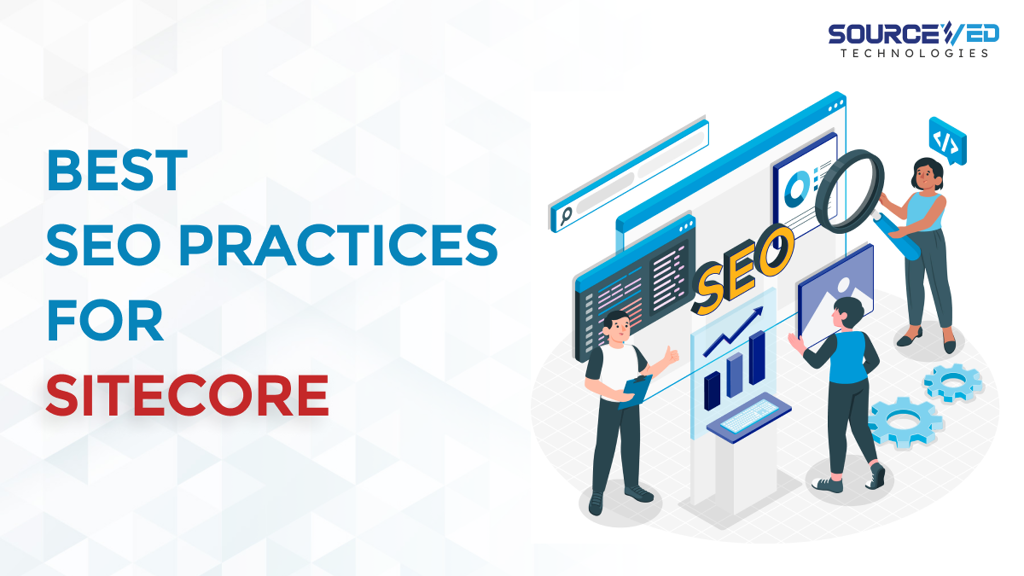
SEO is one of the most vital factors for the online presence of a Sitecore website. Sitecore is highly authoritative and reputable due to its age, size, and traffic volume. These websites have a higher chance of outgrowing their rankings, and it is more likely that the published data set will be shared on several social platforms as an outcome of increased traffic. Due to these reasons, an effective on-page SEO is essential for these sites.
Read the blog to learn about the best SEO practices for Sitecore.
What is Sitecore?
Sitecore is a renowned digital experience platform and a powerful CMS utilized by medium and large-scale organizations worldwide to create a personalized and seamless digital experience for users. This platform is powered by .NET CMS, which is an enterprise-level content management system that has been developed on ASP.NET.
Best SEO Practices for Sitecore
1. Canonicalization
Canonicalization is crucial to let the search engine know which URL to index and show users in case of duplicate URLs. Canonical tag helps prevent the search engine from indexing duplicate or wrong URLs.
So, take advantage of this tag for your Sitecore websites and guide search engines to index the most relevant website links. You can follow these practices for practical canonicalization efforts.
- Canonicalize your URLs only once and repeat the process if you have already done it.
- Put a canonical tag on your homepage to avoid duplication.
- Add canonical tags to pages with similar URLs and reduce repeated content. It helps comply with search engines’ regulations and improve the website’s online visibility.
- Use HTTPS instead of HTTP.
2. Pages & Components
Ensure elements have the appropriate header tags for the pages and sections in which they will appear. When creating pages and components, heading hierarchies should be thoroughly understood and used. Rich text fields should be included in elements or elements that allow the nesting of any aspect. To benefit from customization and multilingualism, avoid hardcoding text documents in favor of editable fields. All pages and components should be created with “mobile first” in mind. With this in mind, make sure your designer is giving good comps. Once finished, check the HTML of the pages and components.
Which SSL certificates must be bought or accessed will be decided in collaboration with the customer by implementation partners. Choose the certificates carefully based on the customer’s requirements, such as single domain, unrestricted, single subdomain, numerous subdomains, etc. Make a plan for updating the SSL certificates as they become invalid. Automate if you can! Set calendar alerts for important certificate expiration dates. In the past, even the Googles and Apples of the globe failed to achieve this, resulting in necessary service interruptions.
3. Image Optimization
Images are vital to enhancing a visitor’s user experience on your website. If appropriately utilized, ideas can contribute to Sitecore’s traffic while boosting its reach. Further, images are one of the most significant contributors to page loading time. Thus, the first step is picking the most suitable image format. The most commonly used image format is PNG and JPEG; these image formats vary due to their compression techniques. Because of this, the image files between such items can vary greatly.
Additionally, image compression should be done. Image compression is a technique used to reduce the size of photographs without sacrificing quality. The more time it takes for your page to load, the higher the image file size is. Therefore, it’s crucial to compress your photographs before uploading them to your website.
4. Coordination and DNS flipping
The marketers should work with the clients to create a plan for turning on the website by updating DNS. Careful execution and planning are essential because DNS alterations are challenging or impossible to test before Sitecore goes live. Moreover, if errors are made, confirming the changes is quite challenging due to the time that passes due to the propagation of DNS changes throughout the web. Therefore, having a DNS provided can assist in the prolongation of DNS for smooth verification.
5. Efficient Title Tags
This is one of the most crucial on-page SEO variables, presuming you’ve previously done your keyword research. Here is a step-by-step tutorial on how to conduct keyword research if you haven’t already. The title tag informs search engines about the page’s content and whether it is appropriate for that particular keyword or keyphrase. Every page’s title tag should be different. If a user has entered those terms in a search, search engines will display those keyword phrases in the search results. This improves click-through rate and visibility. Make sure to write your title tag efficiently while keeping it between 55 to 65 characters in length, including spaces.
6. Structured Data Markup
Structured Data Markup is an internet community effort to organize data in a standard organized way to present data to online visitors. Schemas for Structured Data Markup are available at schemas.org. Every website has some structured data. For example, if it is related to travel, it can offer “Place” as its Structured Data Markup type.
7. Keeping URLs Short & Descriptive
Another great place to include keywords is in your URL structure. Including key phrases in your URL is a ranking factor, according to studies. That doesn’t mean you should go crazy and stuff your URLs with keywords. Use the same caution and restraint in your title tags and meta descriptions. It’s common for a URL to resemble a condensed version of the title tags. However, before publishing, you should always double-check that your URL needs to follow other SEO best practices, such as keeping URLs narrow and using lowercase letters.
Conclusion
So, you can follow these best SEO practices for your Sitecore websites, increase traffic and engagement, and reduce bounce rates. If you need help building Sitecore websites from scratch or optimizing existing ones, you can reach out to us at [email protected] and book a free consultation and get a quote.
As a leading Sitecore development company, we can help you design, develop, and deploy SEO-friendly, high-performing, and reliable Sitecore websites and apps.



